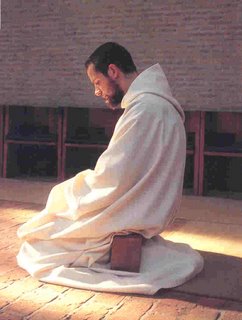 "One of the moral diseases we communicate to one another in society comes from huddling together in the pale light of an insufficient answer to a question we are afraid to ask."
"One of the moral diseases we communicate to one another in society comes from huddling together in the pale light of an insufficient answer to a question we are afraid to ask." - Thomas Merton, "No Man Is an Island"
If there are any recurring themes in my rantings - the most intentional is that of trying to encourage the re-thinking of our perception of things as they are, or reality, as we perceive it.
Cataphatic versus Apopathic Thinking
In Western society we tend to be cataphatic about our understanding of the universe and reality. What that means is that we try to base any new knowledge on what is previously known. So when we consider or debate matters like God or absolutes that may be outside our experience, we drop into a "comfort zone" of trying to relate it to our current understanding, which ultimately results in most cases to our mistaking the analogy or image for the reality.
As a contrast, the classic Eastern view of reality tends more to the apopathic. An outlook that tends to base understanding on what something is not, rather than in comparing it to something familiar from experience. Thus, from an apopathic viewpoint, something does not have to be rationally understood in order for it to be true.
However, taken to an extreme, this view can also have its problems, when it can often lead to an irrational fear of the unknown or to crippling superstitious beliefs.
A rather comical illustration of the consequences of an imbalance between these two viewpoints is revealed in a famous Zen saying:
"...to point at the moon a finger is needed, but woe to those who take the finger for the moon... "
A Balanced View
A balanced view would not try to categorize the "finger" doctrinally but use it simply as a means of understanding the "moon." The western church over the past 500 years has tried to define and codify God and, as it were, put Him in a "box" - as a consequence, I think, of the classification of Theology as a science, rather than as a matter of mystical experience as it was in the ancient church.
So, what's the bottom line of all this?
Somehow I think we need to get back to the practice of silence - not necessarily the "Quaker" kind of silence - that always waits for the Spirit to "speak." But a silence like an extended rest in a piece of music. Silence that punctuates the incessant talking, speculating and pontificating that goes on - sometimes even done with the best of intentions.
A silence like that described in one of my favorite songs:
"The smile on your face lets me know that you need me
There’s a truth in your eyes sayin’ you’ll never leave me
The touch of your hand says you’ll catch me if ever I fall
You say it best when you say nothing at all"
- From "When You Say Nothing At All" by Allison Krause
Seeking the truth is always a good thing - but sometimes when we are constantly asking questions and busy ourselves in reading books, attending lectures, and in performing constant "spiritual" activity we aren't ready, or don't stop long enough to hear the answer.
Sometimes the best kind of answers are those that are given in silence.
1 comment:
I'm a huge fan of silence. It drives my clients crazy when we work in their houses without music, TV, radio or SOME kind of extraneous noise. They keep asking "are you SURE you don't want me to turn on a radio or SOMETHING for you??" I work in houses with a TV blaring in every room of the house. People are incapable of living in their own heads/hearts. Noise is a distraction and even worse, a spiritual cancer, IMO. If you cannot be with someone in silence it means your love is immature and insecure. The fact we cannot be silent or be in silence means our love for God is immature and insecure, He is not in the noise but in the still, small, gentle wind.
Post a Comment